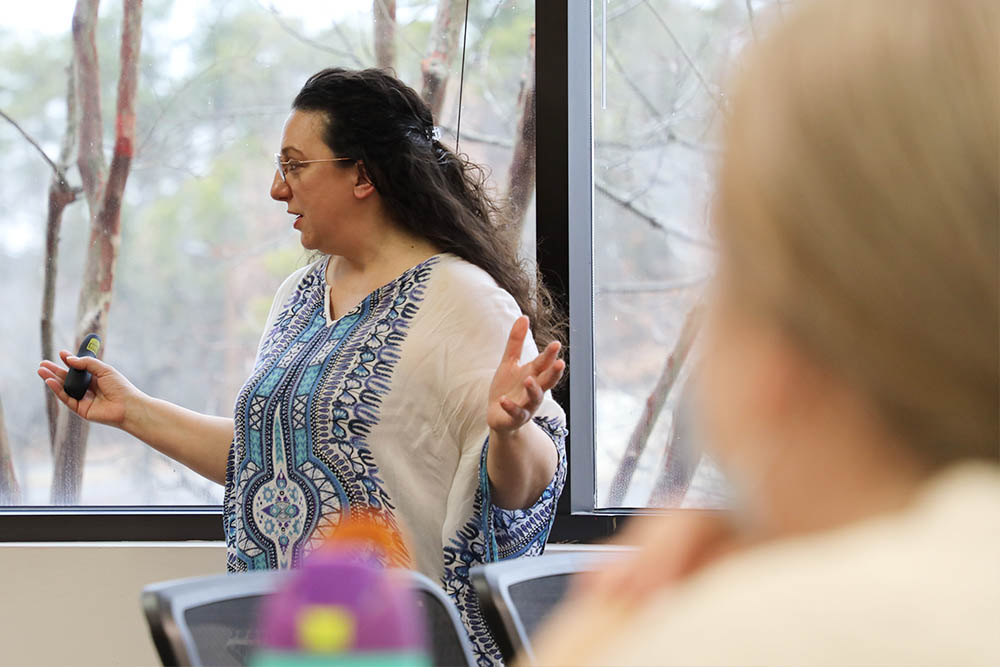
RN to BSN Students 'Buddy Up' With Peer Mentors
Yvonne Cruz (RN to BSN ’25) dreaded going to work.
Though a cardiac tech in an ICU for a decade, when she became an RN on the same unit last summer, a colleague chafed at Cruz’s promotion. Cruz found herself balancing her UVA courses, her clinical work, her family—and a workplace bully.
She turned first to Mark Benedict (RN to BSN ’24), a neurological nurse and classmate, her assigned mentor.
“I didn’t cry at home, and of course couldn’t at work, and when I talked to Mark about what was happening, I caught myself getting emotional again,” Cruz said. “But it was also therapeutic, laying out the story, considering my resources, and finding a solution.”
Benedict, she said, helped her reset.
[VIDEO] "Buddy Up"
“He was like my voice of reason while everything was chaotic,” she said. “It wasn’t really like talking to a mentor; it was like talking to a friend. It also made me realize, ‘Oh, I really do need to talk to my boss, to HR, to my professors. There are resources available—use them.’”
“It’s especially important for nurses because we’re at the pointy edge of healthcare: we see a lot, we do a lot, and I think it’s made to help everyone academically, but also in other ways.”
Mentor and RN to BSN student Mark Benedict (BSN '24), a UVA Health neurological ICU nurse
Peers have always been informal sources of support for nurses who return to school. But thanks to assistant professor Crystal Toll, every RN to BSN student now enjoys a formally assigned mentor during the two-year program as well, thanks to a new pilot “buddy” system that students at the program’s three sites (Charlottesville, Fairfax, and Richmond) are raving about.
The idea sparked when Toll observed her Richmond students’ “outsider” status.
“They weren’t quite satisfied, or engaged, and lacked a sense of really belonging in the School, and to the program,” Toll said. “I heard how nervous they were, how they didn’t know how they’d balance the work-life thing, and how they wondered out loud about the people who’d walked in their shoes before they did.”
Toll first suggested focus groups and surveys, to the laughter and groans of her students, who, she realized, “didn’t want to add anything extra to their plates. So that spiraled into the idea, ‘Well, what if it wasn’t extra? What if it was part of the program?’”
“It’s made me realize that other people are looking up to me, and that what I say matters to them."
RN to BSN student and mentor Kaitlyn Niesent (BSN '24)
Fast forward nearly two years and the mentor-mentee program is part of the RN to BSN fabric. Practiced skills and concepts are mapped to course objectives (first years’ Foundations course and second years’ Leadership course). Toll even earned a $20,000 grant to upgrade the matching software students use.
Each month, mentor-mentee pairs take part in guided conversations: about work, on-unit safety, difficult coworkers, and how they cope with the “heaviness” of navigating work with people affected by critical illness.
“It’s especially important for nurses,” explained Benedict, a former nurse’s assistant at a Chesapeake community hospital emergency room, whose first mentor was a UVA wound care nurse, “because we’re at the pointy edge of healthcare: we see a lot, we do a lot, and I think it’s made to help everyone academically, but also in other ways.”
Acting as a mentor also gives students like Kaitlyn Niesent (RN to BSN ’24) a confidence boost.
“It’s made me realize that other people are looking up to me, and that what I say matters to them,” Niesent said. “Sure, it can feel like a big responsibility, but you can look at this as something you get to share with someone else. Because everyone has something to share.”

